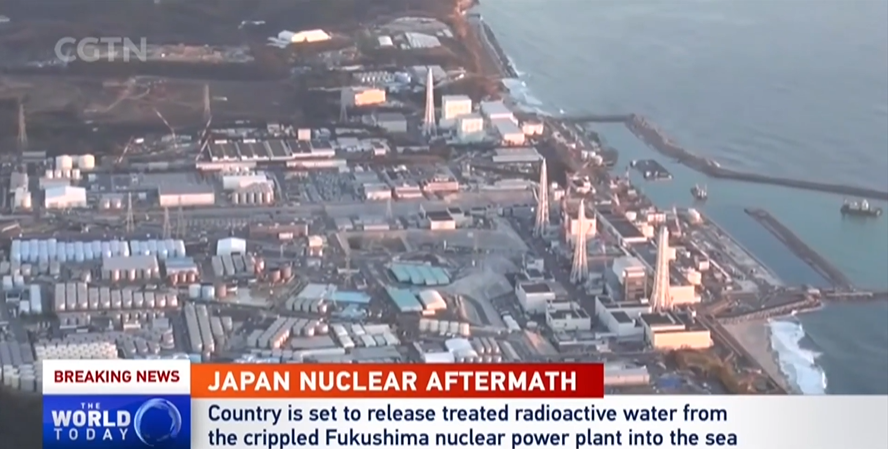China has expressed serious concern over Japan's plan to discharge contaminated radioactive wastewater from Fukushima Prefecture into the sea, a Chinese Foreign Ministry spokesperson said on Tuesday, terming the decision "extremely irresponsible."
"We strongly urge the Japanese side to recognize its responsibilities, adopt a scientific attitude, fulfill its international obligations and respond to the serious concerns of the international community, neighboring countries and its own people," said the spokesperson.
The plan shall not be conducted without full consultation and agreement with all interested countries and the International Atomic Energy Agency (IAEA), the spokesperson stressed.

Earlier in the day, Japanese Prime Minister Yoshihide Suga announced the decision to discharge the wastewater.
Noting that the Fukushima nuclear accident is one of the most serious ones in the world so far, the spokesperson said that the accident caused a large amount of radioactive material to leak, which has had a profound impact on the marine environment, food safety and human health.
Citing the assessment report of the IAEA, the spokesperson said that releasing nuclear wastewater into the ocean will impact the marine environment and the public health in surrounding countries.
The treated wastewater still contains other radionuclides, which need further purification treatment, according to the report.
The spokesperson also mentioned several experts and organizations' assessments results warning people of long-term impact of discharging nuclear wastewater into the ocean.
"Japan's unilateral decision on disposal of nuclear wastewater from Fukushima nuclear station by releasing it into the sea is extremely irresponsible," the spokesperson said.
In spite of domestic and foreign doubts and opposition, Japan has not fully consulted with neighboring countries and the international community in making the decision, the spokesperson added.
The sea is the common property of mankind and the disposal of nuclear waste from the Fukushima accident is not a domestic issue of Japan, said the spokesperson.
IAEA warns 'further harm' to environmental protection
The chief of the IAEA responded to the plan by calling for efforts to forestall further harm to environmental protection, food safety and human health.
IAEA Director General Rafael Mariano Grossi made the remarks on Monday while talking about Japan's decision on the treated water with Wang Qun, Chinese envoy to the United Nations and other international organizations in Vienna.
Grossi said the IAEA had taken note of the concerns of relevant parties within the board with mounting global attention to this matter, and the agency will actively advance its work on the assessment and monitoring activities in an impartial, objective and scientific manner.
Expressing China's support for the IAEA in playing a vital role in the assessment and monitoring work, Wang said it is legitimate for China as a neighboring country, along with all other stakeholder countries, to be involved in the agency's work on this front.
ROK expresses 'strong regret'
Right after Suga's announcement, the government of the Republic of Korea (ROK) expressed "strong regret" over Tokyo's decision.
Koo Yoon-cheol, head of ROK's Office for Government Policy Coordination, said that the government will take every necessary measure in line with the principle of keeping its people safe from the contaminated water from the Fukushima nuclear plant.
U.S. calls it an 'acceptable approach'
"We look forward to the Japan's continued coordination and communication as it monitors the effectiveness of this approach," said the U.S. State Department in a statement on Tuesday.
In the statement, the department stressed Japan has weighed the options and effects and has been transparent about its decision. The government "appears" to have adopted an approach in accordance with globally accepted nuclear safety standards, it added.






